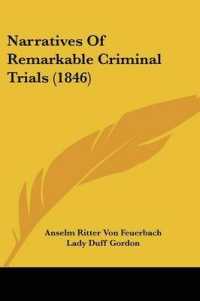- ホーム
- > 洋書
- > 英文書
- > Psychology
Full Description
Strategy has emerged as a watchword of modern change efforts. Calls to be strategic are sounded in the private sector, government, philanthropy, and the not-for-profit sectors. Management experts stress the importance of strategic thinking. Change agents are urged to act strategically. Strategic planning has long been a mainstay of organizational development. Leaders in all sectors talk not about theories of change or logic models, but about being strategic: Strategic thinking. Strategic planning. Strategic results. Being strategic. Strategy execution. Effective strategies. Adapting strategically. And, now, evaluating strategy. But strategy is a new unit of analysis for evaluation. Traditionally, evaluation has focused on projects, programs, products, policies, and personnel. What does it mean to treat strategy as the evaluation focus, as the thing evaluated? What is strategy? How does one evaluate strategy? What are the implications of this new direction for evaluation theory, methods, practice, and, ultimately, use? This issue examines these questions and provides examples of strategy-focused evaluations.
Evaluating strategy is not about evaluating strategic planning, or even strategic plans. It's about evaluating strategy itself. Strategy is the evaluand. That poses new challenges and offers new opportunities to meet the information needs of evaluation users. For evaluation to be relevant to decision makers and leaders, the focus of the evaluation must be on what they are concerned about and what they care about. Increasingly, they care about identifying and implementing effective strategies. That's where evaluation enters the picture. Evaluating strategy has the purpose of making strategy more effective, differentiating effective from ineffective strategies, and contributing to the ongoing development and adaptation of strategy in response to changing conditions and real-world complexities. Evaluating strategy is a new direction for evaluation, one that is likely to take on increasing importance--if evaluators learn to do it well. This issue takes up that challenge. This is the 128th volume of the Jossey-Bass quarterly report series New Directions for Evaluation, an official publication of the American Evaluation Association.
Contents
EDITORS NOTES (Patricia A. Patrizi, Michael Quinn Patton). 1. Strategy as the Focus for Evaluation (Michael Quinn Patton, Patricia A. Patrizi). This chapter examines what it means to treat strategy as the unit of analysis and focus for evaluation. 2. Strategy Evaluation: Experience at the International Development Research Centre (Tricia Wind, Fred Carden). This chapter explains how IDRC uses strategic evaluations, and explores potential implications for evaluation of Henry Mintzberg s ideas on tracking strategy. 3. Death Is Certain, Strategy Isn t: Assessing the Robert Wood. Johnson Foundation s End-of-Life Grant Making (Patricia A. Patrizi). This chapter discusses a retrospective evaluation of the Robert Wood Johnson Foundation s 20-year strategy to improve care at the end of life. 4. The W. K. Kellogg Foundation s Devolution Initiative: An Experiment in Evaluating Strategy (Kay E. Sherwood). Informed by the perspective of evaluation as a strategic intervention, this chapter revisits evaluation of a major and controversial government reform, welfare devolution, and a philanthropic foundation initiative that mobilized around the reform s implications, including external evaluation of that initiative. 5. Strategy Evaluation: Emerging Processes and Methods (Patricia A. Patrizi). This chapter distinguishes prospective and retrospective evaluations of strategy, and offers lessons on framing a strategy evaluation, determining strategy boundaries, and data collection and analysis. Index.






